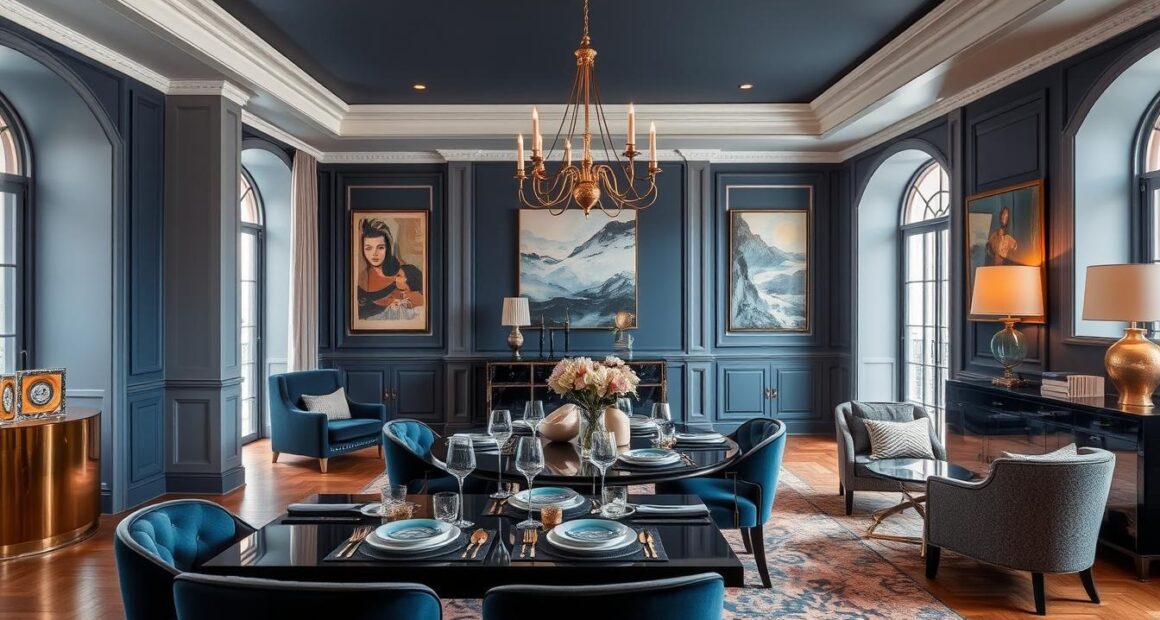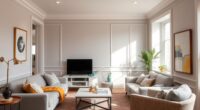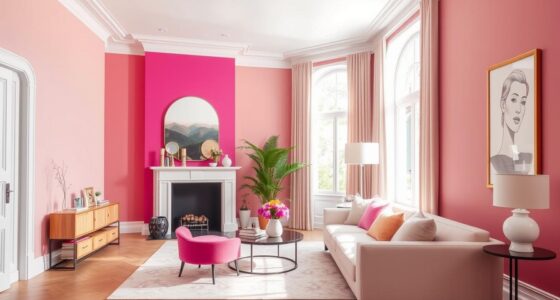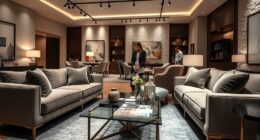What do you think of when you imagine your dining room? Maybe it’s the sound of family laughing together. Or perhaps it’s memories of long dinners with friends. Your dining room isn’t just for meals; it’s like a blank canvas. You can fill it with colors that show off your personality. Finding the perfect color combo can change the feel of the room. It makes it a welcoming place for joy and togetherness. When looking at stylish dining rooms, think about how colors can show your style and make dining better. Let the magic of colors turn your dining room into a space where great moments happen.
Key Takeaways
- A well-chosen color can enhance the ambiance of your dining room.
- Bold colors may evoke deeper emotions and bring a unique charm to the space.
- Layering multiple shades within the same color family can create depth and interest.
- Consider how natural light interacts with different colors when selecting your palette.
- Reflecting personal style through color can make every meal feel special.
Why Color Matters in Your Dining Room
The importance of color in dining rooms is more than just looks. It sets the mood, changes how we interact, and adds to the dining experience. Color psychology tells us that certain colors can make us feel certain ways. For example, warm colors make a room feel welcoming and are great for gatherings. But cool colors can calm a space while possibly reducing hunger.
It’s key to pick the right colors for your dining space design. Soft yellow can bring a cozy feel, boosting comfort and chat. Apple green adds a refreshing energy. Yet, bold reds and oranges might stir up too much emotion for meals shared with others.
Color trends also matter. The current favorite, neutral gray, matches well with many decor pieces. Truffle brown looks good with wood, making the space feel unified. Choosing colors that fit both old and new styles makes your dining area welcoming and stylish.
Bold, Beautiful Blue
Blue shades for dining rooms offer a versatile palette. It’s perfect for creating captivating and inviting spaces. The spectrum ranges from soft, icy whites to deep, dramatic indigos. This ensures variety in your dining room design. Not only do blue tones induce calmness, they also adapt to different lighting conditions. This enhances the atmosphere throughout the day.
Types of Blue Shades to Consider
When selecting bold color choices, consider these standout blue shades:
- Duck’s Egg Blue – A vibrant hue that pairs beautifully with pure whites and cool greys.
- Forgotten Lake – A rich indigo, a striking alternative to turquoise.
- Clear Your Mind – A balanced mix of blue and purple, perfect for unique accents.
- Ocean Fog – A light blue that complements various interior styles effortlessly.
- Acapulco Cliffs – A bright muted marine aqua-blue, great for contemporary dining spaces.
Combining Blue with Other Colors
Color combinations with blue maximize its appeal. Blues work seamlessly with cooler tones, like grey, for a modern look. Here are some effective accent colors for blue:
- Warm woods bridge the coolness of blue.
- Bright white for a fresh, crisp finish.
- Deep reds create a charming contrast.
Consider how these combinations interact within your dining room. Blue tones can layer without clashing. This presents a wonderful palette for reimagining your space.
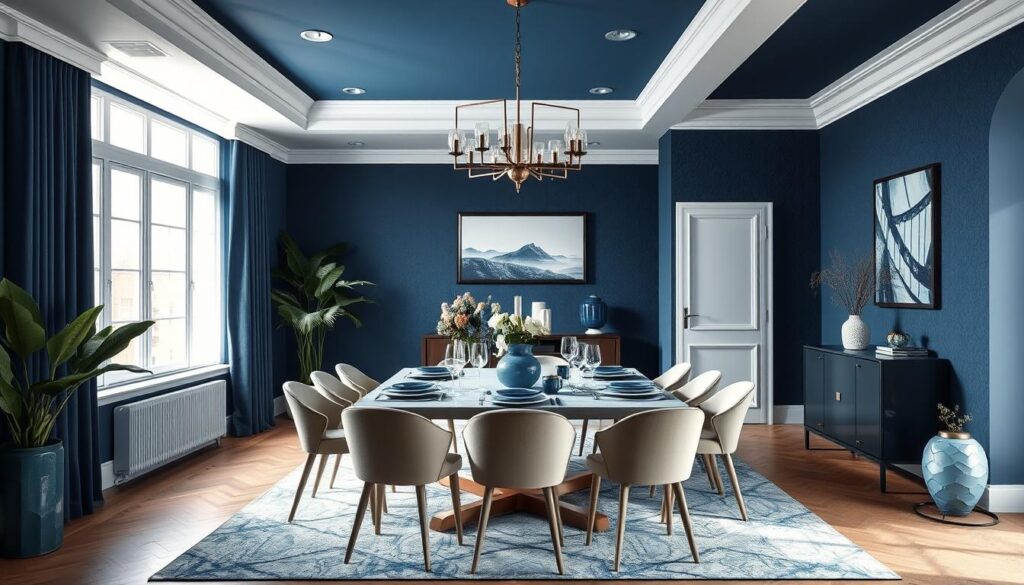
| Blue Shade | Characteristics | Best Pairing Colors |
|---|---|---|
| Duck’s Egg Blue | Bright and refreshing | White, Cool Greys |
| Forgotten Lake | Deep and dramatic | Neutral Tones |
| Ocean Fog | Soft and alluring | Light Grays, Warm Woods |
| Acapulco Cliffs | Muted marine aqua | Dark Browns, Whites |
Soothing Green Tones
Green colors in the dining room bring peace and calm, perfect for relaxing spots. Many interiors use green shades to make a calm vibe. Whether you like soft sage or bold emerald, you’ll find a green that fits your style.
Why Green Is a Great Choice
Green is more than a color; it means nature and peace for our minds. Soft greens like sage make a healing space, great for eating and hanging out. These colors make you feel good and add a fresh look to your meals.
Pairing Green with Wood and Neutrals
Mixing green with wood makes your dining area feel warmer. Try forest green with light wood for a cozy yet elegant look. Adding white or glass details brightens the space. Here are some nice color mixes to try:
| Color Combination | Effect |
|---|---|
| Sage Green + Bleached Wood | Creates a relaxing and airy atmosphere |
| Forest Green + Light Wood | Enhances coziness while maintaining elegance |
| Olive Green + Neutral Tones | Adds depth and sophistication to the space |
| Emerald Green + Gold Accents | Introduces luxury and a high-end feel |
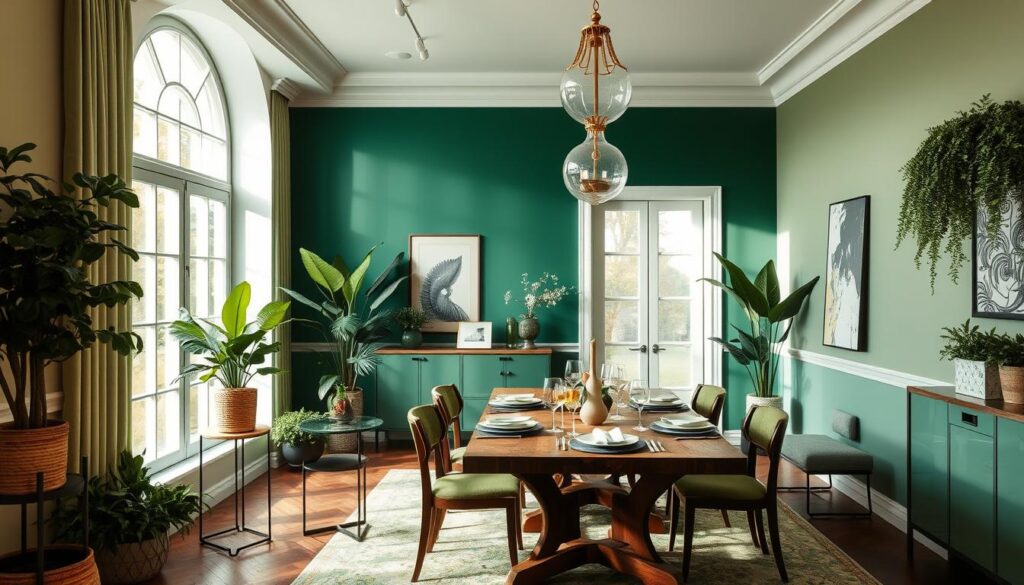
Playful Pink Accents
Adding pink to interior design brings a fun vibe. It goes well with many styles, like Scandinavian or bold maximalism. This color makes any dining area look stylish, using either small touches or big ones.
Different Shades of Pink for Various Styles
Pink colors for dining rooms range from light blush to bright fuchsia. Each offers unique design possibilities. Here are some popular pink shades and the styles they match:
| Shade | Style | Example Use |
|---|---|---|
| Blush Pink | Minimalist | Light pink walls with beige accents for a relaxed ambiance |
| Mauve | Scandinavian | Cozy textiles combined with warm wood features |
| Fuchsia | Maximalist | Bold fuchsia furniture paired with bright green or orange |
| Deep Raspberry | Contemporary | Accent pillows and decor in a predominantly grey room |
Maximalist vs Minimalist Approaches
The debate between maximalism and minimalism is always interesting. In minimalist designs, soft pink adds a calm, open feel. You might see light pink walls or soft pink flowers that help you relax.
In a maximalist room, bright pinks stand out more. They’re often put together with colors like teal or yellow. This makes a lively space that’s great for a stylish dining area. Using bold colors changes the mood, making design both fun and eye-catching.
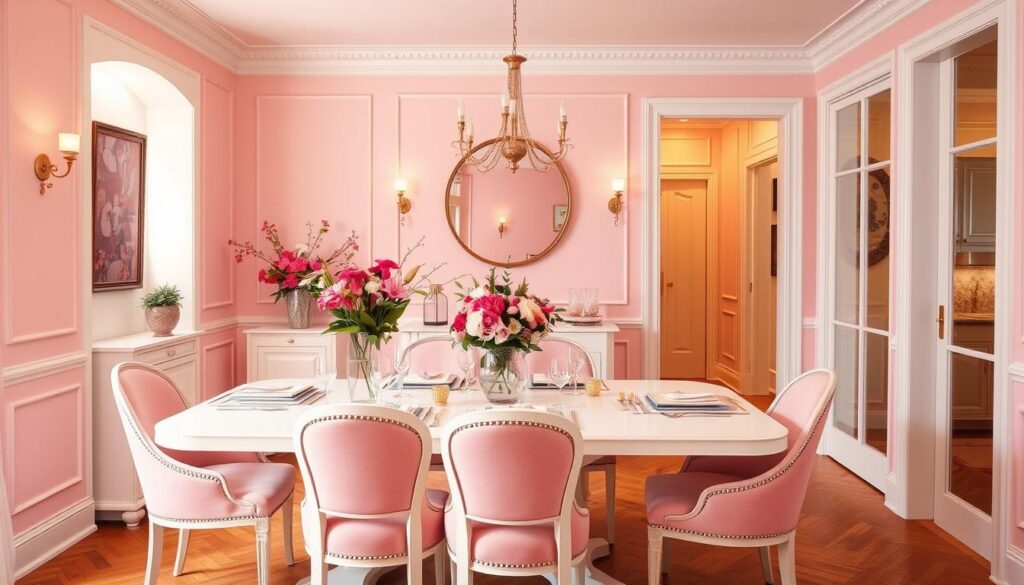
Sunny Yellow for Cheerful Spaces
Adding a cheerful yellow color can make the dining room brighter and more welcoming. Yellow adds warmth and happiness, perfect for gathering spaces. It turns the area into a joyful place for meals and fun.
Best Practices for Using Yellow
To use cheerful yellow effectively, follow these tips:
- Choose a light yellow to make small spaces look bigger.
- Paint one wall in sunny yellow for a bold but balanced look.
- Mix mustard yellow with earthy tones for a calm vibe.
- Add navy blue or deep green for a lively color mix.
- Highlight yellow walls with gold or brass for an elegant touch.
Matching accents can tame yellow’s brightness while keeping a cohesive style. Mixing shades can create harmony, from light to deep tones.
Accent Colors That Complement Yellow
Selecting the right accents is key for yellow walls. Here’s a table of colors that look great with yellow:
| Accent Color | Effect |
|---|---|
| Navy Blue | Creates a striking contrast, adding depth and sophistication. |
| Charcoal Gray | Balances brightness while maintaining a modern aesthetic. |
| Deep Green | Brings an earthy feel that enhances relaxation and calmness. |
| Pastel Shades | Softens the vibrancy of yellow, creating a light and airy feel. |
Mixing different decor elements can improve your dining room’s cheerful feel. See how sunny yellow changes your home!
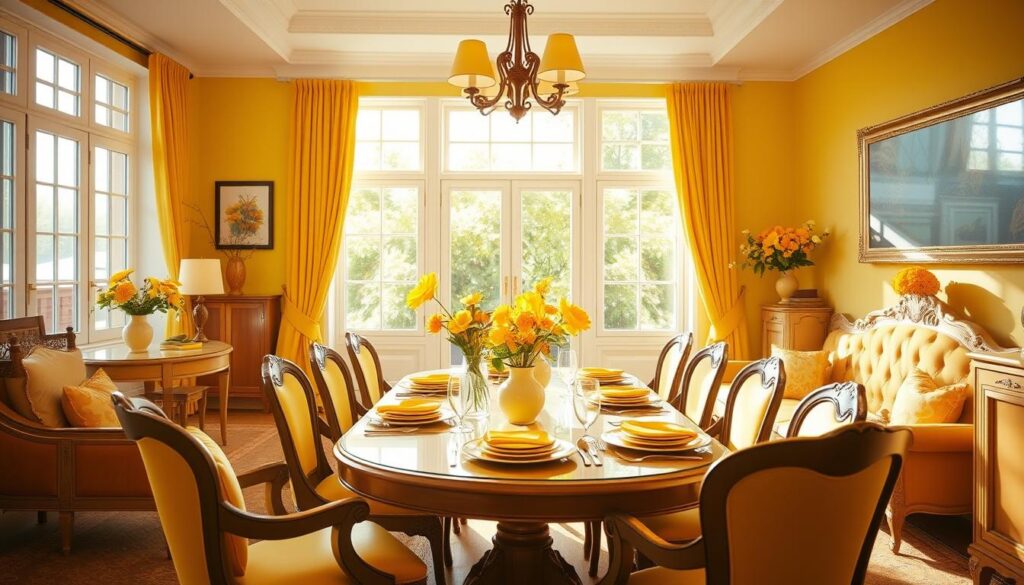
Energizing Orange Hues
Choosing the right orange can make dining rooms warm and inviting. This color brings cozy vibes and liveliness. Think about using “Rumba Orange” or “Party Peach” from Benjamin Moore to spice up your decor and ensure guests feel comfortable. It’s crucial to balance these warm shades well.
Pairing orange with white accents helps keep the atmosphere bright and cheerful.
Creating a Cozy Atmosphere with Orange
Orange shades can change a room’s feel under natural light. Colors like “New Dawn 133” and “Citrus Orange” add warmth, making meals more fun. Mixing orange with navy blue also has a striking effect, improving your dining area’s look.
For a rustic vibe, mix orange with brown. This combo gives a cozy, earthy feel, perfect for country-style homes.
How Light Affects Orange Shades
The way light hits orange colors affects how we see them all day. Morning light makes shades like “Tooty Fruity” look fresh. Sunset light brings out their warmth and depth. This means you can get creative with color pairings.
Adding emerald green increases the room’s energy by about 45%. The right lighting and design choices turn dining rooms into welcoming spots for friends and family.
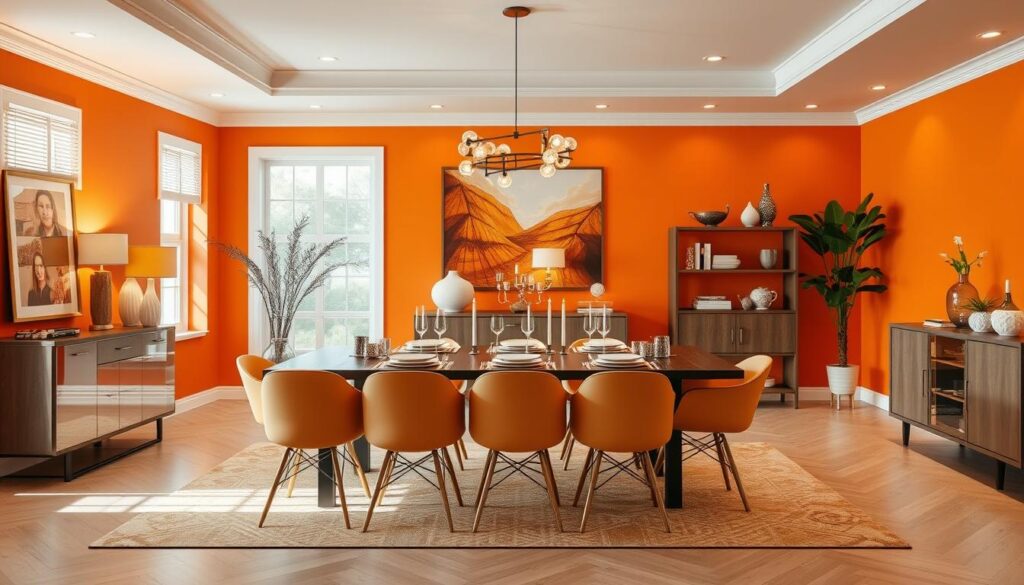
Purple for Creative Elegance
Purple brings luxury and creativity to dining areas. It ranges from light amethyst to bold violet. Using purple paint ideas, your dining area becomes vibrant, perfect for conversations and gatherings.
Purple Shades That Stand Out
It’s important to choose the right purple shade. Here are some top picks:
- Orchid Mist: Light amethyst, versatile and elegant for modern homes.
- Water Iris: A pale, delicate purple, great for smaller spaces to enhance light.
- Violet Vogue: Mixes peony and violet for a modern flair.
- Frosted Lilac: Intense yet soft, pairs well with dark wood or sleek decor.
- Jam Session: Silvery mauve with magenta hints, offers various color combos.
- Pastel Plum: Makes large dining areas stand out, ideal for feature walls.
Complementing Purple with Furniture Choices
Matching furniture with purple is key to your dining room’s balance. Here are some options:
| Furniture Option | Effect |
|---|---|
| White Furniture | Creates a fresh contrast, enhancing purple’s vibrancy. |
| Light Wood Pieces | Brings warmth, balancing vivid purple tones. |
| Metallic Accents | Boosts luxury dining look with a sophisticated shine. |
| Soft Grey Furnishings | Keeps the palette balanced; avoid dark greys. |
| Pink Accessories | Makes a vibrant, harmonious setting, reminiscent of flowerbeds. |
| Blue Delicates | Offers a soothing contrast, a fine accent against purple. |
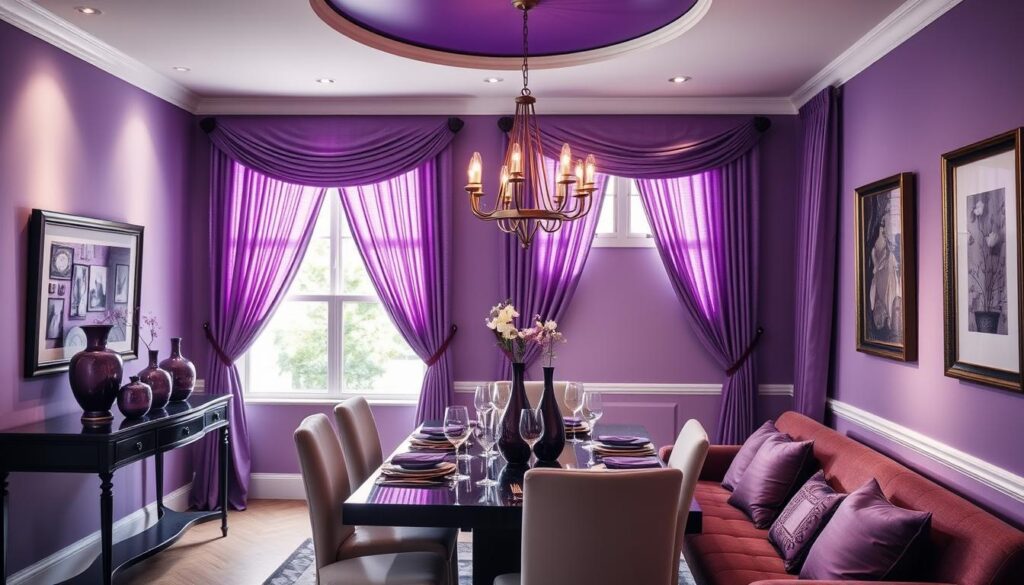
Classic White for Timeless Style
Choosing white for your dining room offers unmatched versatility. It creates a timeless look that always stays in style. White walls open up endless decor ideas, making the space look bigger and brighter.
This choice fits well with classic design rules.
Benefits of Choosing White Walls
White walls have many benefits:
- They make small dining rooms seem bigger.
- White works as the perfect canvas for bright accessories.
- Timeless interiors use white to stay fresh through the years.
- It’s a neutral base, making it easy to change your decor.
How to Accessorize a White Dining Room
Decorating white rooms can improve their look. Here are some tips:
- Add colorful art to make white walls lively.
- Textured table linens add depth against a plain background.
- Wooden pieces or furniture add a cozy contrast to white.
- Plants or greenery bring a natural touch.
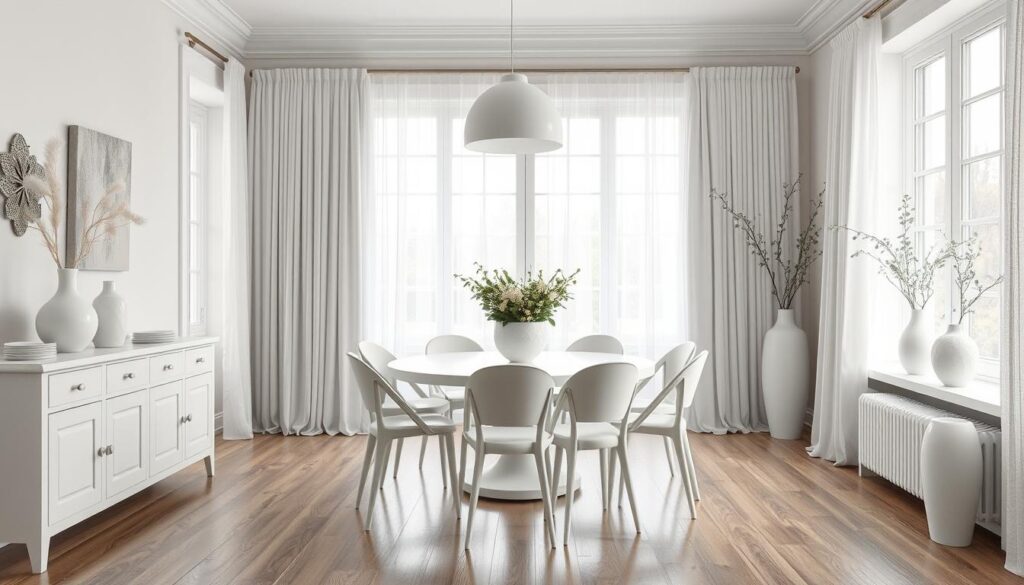
Using these ideas, you can make your white dining room stylish and welcoming. It will be easy to adapt to different seasons.
Modern Black Dining Rooms
Choosing black for your dining room adds elegance and sophistication. Good lighting is key in darker rooms to boost the mood. It changes a cramped space into a cozy spot for friends and family.
Creating Space with Good Lighting
Proper lighting makes a dining room look bigger and better. You have a few options:
- Black chandeliers offer a stylish focal point while providing ample light.
- Vintage-inspired sconces add personality and character to your decor.
- Incorporating indirect light sources can soften the dark elements of your design, enhancing comfort and mood.
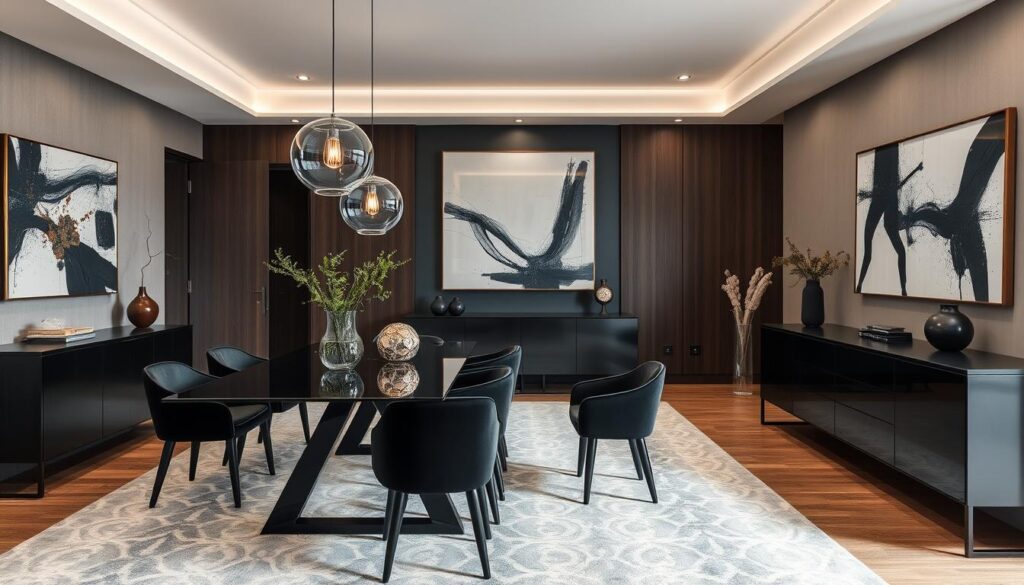
Furniture Styles that Pair with Black
Picking the right furniture is key for a themed room. Here are some ideas:
- Opt for sleek, modern dining tables that fit a minimalist aesthetic.
- Upholstered black dining chairs enhance comfort and complement black tables beautifully.
- Incorporate contrasting furniture selections, such as black and wood pairings, to balance bold black elements with warmer materials.
- Metallic accents can introduce glamour to your dining space, making it visually striking and sophisticated.
Mixing the right light and furniture lets black dining rooms feel personal and stylish. It creates a space you’ll love, following the latest design trends.
Gorgeous Grey Combinations
Grey creates a sophisticated look in dining rooms. It blends light and dark tones well. You can choose light or dark grey to set the room’s mood. Light greys make the room feel breezy and are great for Scandinavian styles. On the other hand, dark greys add drama but keep things classy.
Using Light vs Dark Grey
Light greys are soothing and great for creating a feeling of more space. For example, Classic Gray 1548 by Benjamin Moore is excellent as a background for art. Darker shades like Down Pipe No. 26 by Farrow & Ball change with the light. They can feel cozy or striking.
Here are some advantages of using light and dark greys:
- Light Grey: It makes spaces brighter, feels warm, and matches well with other colors.
- Dark Grey: It adds depth and works well with rich textures or metallics.
Mixing Grey with Other Colors
Grey goes well with many colors, creating chic accents in your dining room. For stylish grey combinations, consider these pairings:
- Bright Whites keep the room feeling fresh with light greys.
- Earthy Tones like browns with grey make a room welcoming, showcased in Granite AF-660 by Benjamin Moore.
- Bold Colors such as deep reds or greens add contrast against grey.
- Pastels combined with grey create a soft, refined look. Pale Smoke 1584 by Benjamin Moore is a good example.
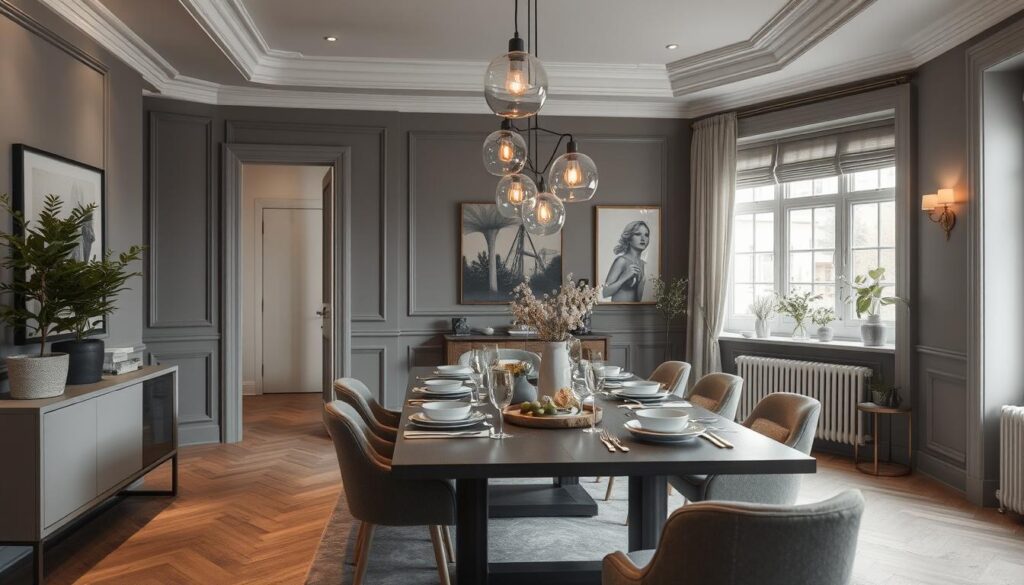
Adding plants and vintage-style rugs enhances a grey scheme. These elements bring life and texture to your space without overpowering it. Using different lights can also warm up cooler greys, making your room beautiful all day.
Daring Dining Room Colour Combination Ideas
Mixing color palettes in your dining room reflects your personal style. Thoughtful color mixing can create breathtaking dining room designs. By selecting shades that complement each other, you enhance the room’s overall atmosphere.
How to Mix Multiple Shades
When combining colors, starting with exploration is key. Begin with a main palette of three colors. This establishes your space’s foundation. Consult a color wheel to find complementary and contrasting shades. Here are a few ideas:
- Pairing deep shades like Brilliant Blue with lighter accents such as Cascade for a balanced look.
- Integrating muted greens like Royal Hunter Green with neutral tones like Summer Suede for warmth.
- Creating contrast with vibrant colors like crimson red against white, inviting energy into the space.
Tips for Maintaining Coherence
To create a serene environment, coherence is crucial. Ensure all chosen colors have similar undertones to keep harmony. Test paint colors on small wall sections under different lights. This will show you how colors look through the day. Follow these tips for color coherence:
- Choose a common theme, like rustic or oceanic, to guide your color choices.
- Add accessory colors that harmonize with your main palette.
- Use contrasting tones, like dark furniture against light walls, for depth.
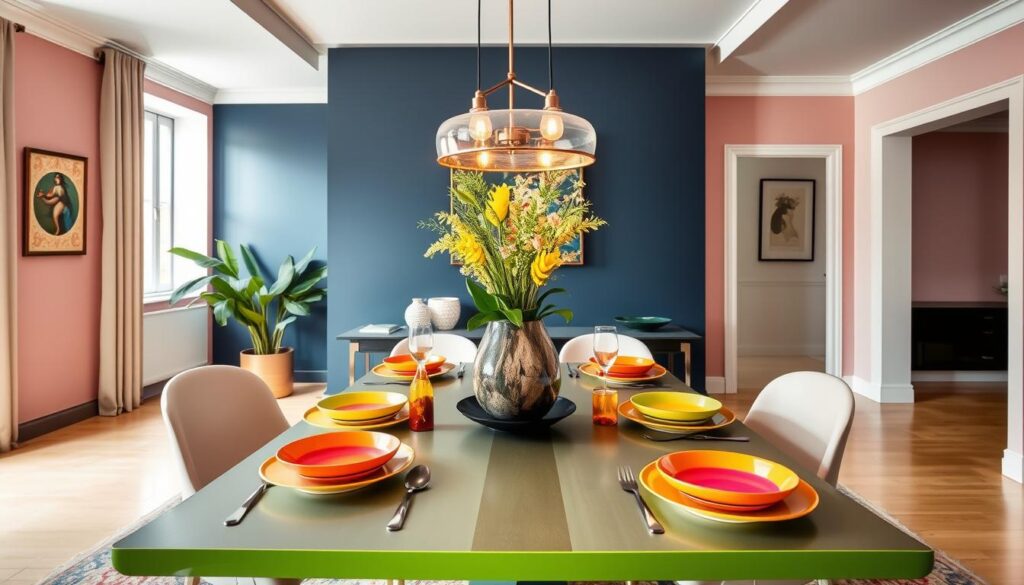
| Color Combination | Effect | Recommended Use |
|---|---|---|
| Deep Blue & Light Aqua | Calming yet engaging | Modern dining spaces |
| Muted Green & Pale Orange | Earthy feel | Spring themes |
| Creamy Whites & Metallics | Subtle elegance | Contemporary settings |
| Yellow, Blue & Black | Playful vibrancy | Casual dining areas |
Choosing the Right Style for Your Space
Making your dining room reflect your style needs careful thought. It’s key to understand what looks good to you. Think about your home’s overall theme. Then, choose colors and decor that match well together.
Understanding Your Dining Room’s Aesthetic
Your dining area should create the vibe you want. You might like rustic charm or prefer modern and simple designs. Or maybe, vibrant, eclectic looks are your thing. It’s important to decorate based on what you love. Lately, more people are choosing bold, dark colors over light ones. It shows that daring designs are becoming more popular.
How to Reflect Personal Style Through Color
Using colors to show your personality is fun. Bright colors, like orange, can make a space feel lively and perfect for family time. Combining bold colors with others, like blue, adds exciting energy to your dining room. To make the area uniquely yours, pick colors that you really like. Adding accent pieces in softer tones or different textures can keep things interesting without being too much.
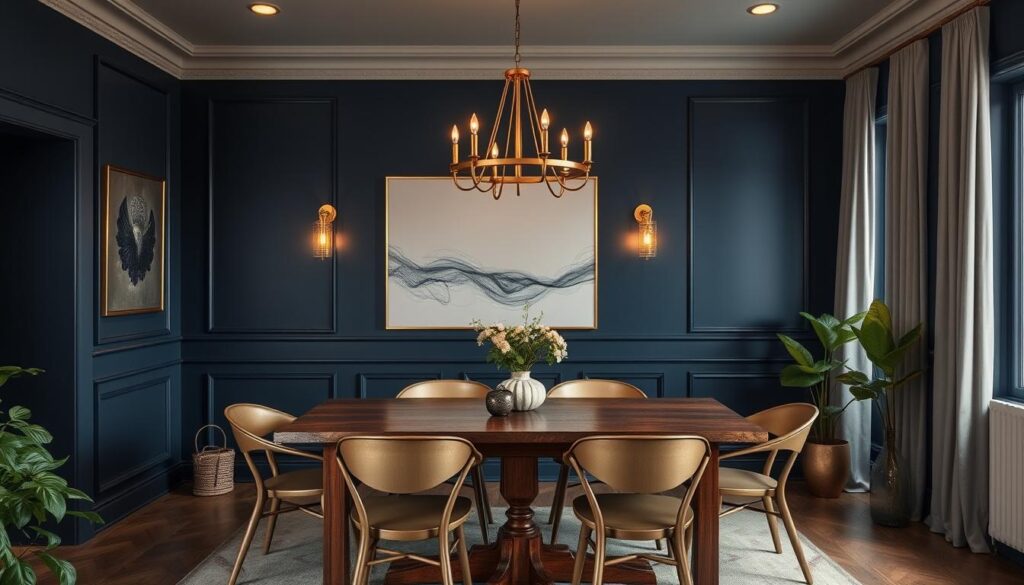
| Color | Aesthetic Effect | Recommended Combinations |
|---|---|---|
| Dark Colors | Creates drama and sophistication. | Metallics or rich wood tones |
| Bold Orange | Stimulates energy and liveliness. | Contrasting blues or soft neutrals |
| Soft Blues | Enhances relaxation. | Whites and natural woods |
| Muted Greens | Connects with nature. | Lime shades or earth tones |
| Layered Whites | Adds depth and tranquility. | Textured fabrics or minimalist designs |
Your dining room should be a place where you can express yourself and feel comfortable. By exploring what styles you like, you can create a room that truly shows who you are.
Conclusion
We’ve looked at many tips for choosing dining room colors. From bold jewel tones to calm neutrals, every color adds to the room’s mood. It’s important to pick colors that show off your personal style, whether that’s with striking walls or fun accent pieces.
When thinking about colors, don’t forget how sunlight affects them. Also, think about how different colors work together. You can go for lots of colors or just stick to one color family. Both ways let you show off your unique style in your dining area.
In the end, we hope you feel inspired to try out new things and make a dining space that’s truly yours. Your dining room should be a place where you enjoy spending time, all thanks to the power of color. Let your creativity run wild and make your dining area special.
